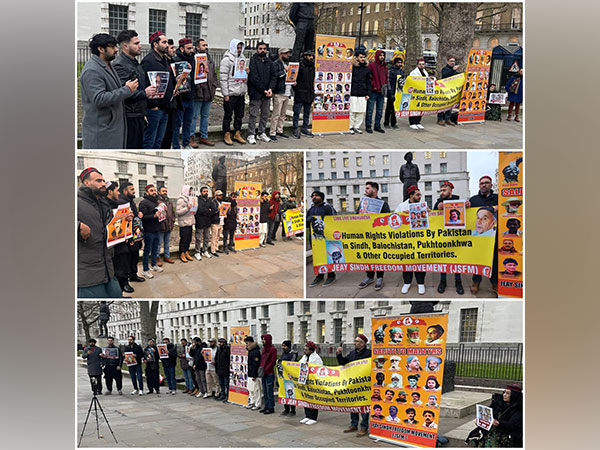In observance of International Human Rights Day, a large-scale protest took place outside the UK Prime Minister’s residence at 10 Downing Street in London.
Organized by the Jeay Sindh Freedom Movement on Tuesday, the demonstration was titled “Protest Against Pakistan’s Occupation and Human Rights Violations in Sindh, Balochistan, Khyber Pakhtunkhwa, Seraikistan, Gilgit-Baltistan, and Kashmir.”
The rally drew participants from various organizations, including the Baloch National Movement, Pashtun Tahafuz Movement, United Kashmir People’s National Party, Hindu Forum Europe, and numerous human rights advocates representing the Baloch, Sindhi, Pashtun, Kashmiri, and other marginalized communities.
The protest centred around condemning Pakistan’s continued occupation of several regions, with the main banner prominently opposing the repression in these areas. It featured images of Baloch, Sindhi, and Pashtun martyrs, along with those who have gone missing due to enforced disappearances by the Pakistani state.
Demonstrators chanted slogans demanding an end to Pakistan’s oppressive policies and called for the recognition of their right to self-determination. Sherbano, a leader of the Pashtun Tahafuz Movement (PTM), condemned the brutal killings of Pashtuns in Wana, Waziristan, and Afghanistan, calling for accountability from the Pakistani authorities. PTM UK leader Salim Zaib highlighted the wrongful imprisonment of political leader Ali Wazir and demanded the release of all political prisoners and missing persons in Pakistan.
Notably, this protest marked a historic milestone as, for the first time in its 52-year history, the Jeay Sindh Freedom Movement witnessed the participation of a nationalist Sindhi political party in a demonstration outside of Pakistan, offering an international platform to their cause.
Kashif, a leader of the United Kashmir People’s National Party UK, condemned the recent presidential ordinance imposed by the Kashmiri government under Pakistan’s direction, calling the oppression faced by Kashmiris unbearable. He emphasized that their fight for Kashmir’s freedom would persist until they achieved self-determination.
The event was led by Sohail Abro, Chairman of the Jeay Sindh Freedom Movement. Numerous speakers addressed the crowd, shedding light on the ongoing atrocities and oppression faced by their communities under Pakistan’s rule.
Jasim Baloch, a leader of the Baloch National Movement UK, spoke about the thousands of Baloch individuals killed or disappeared by the Pakistani state. He asserted that the Baloch struggle, now at a critical juncture, would be strengthened through unity with Sindhudesh and Pashtunistan in their shared quest for freedom.
Qambar Baloch, leader of the Baloch Human Rights Council, emphasized the importance of solidarity among oppressed nations and called for the international community to recognize the ongoing human rights violations in Balochistan and other occupied regions.
Muhammad Ibrahim Ghafuri, a leader of the PTM UK, spoke out against the massacres of Pashtuns along the Durand Line and stressed the necessity of a united struggle against the common enemy, Pakistan.
Human rights advocate Rahul Jesrani denounced religious extremism in Pakistan, particularly the persecution of the Sindhi Hindu community.
He accused the Pakistani state of supporting religious extremists and pointed to the forced conversions of Sindhi Hindu girls and the attacks on Hindu religious sites. Jesrani urged international human rights organizations to take action to address these pressing issues.
The protest concluded with a memorandum being submitted to the UK Prime Minister Keir Starmer’s residence, calling on the British government to take a firm stand against Pakistan’s human rights abuses and to support the rights of the oppressed nations within Pakistan.
Bharati Taylor, former President of Hindu Forum Europe, expressed her solidarity with the oppressed communities of South Asia and condemned the widespread human rights violations in the region.
This event represented a pivotal moment for the Jeay Sindh Freedom Movement, as it raised global awareness about the ongoing struggles of the Sindhi people and the broader fight for justice and self-determination for all oppressed communities under Pakistan’s rule.

